 Petzlover
Petzlover Ojos Azules is originated from Mexico but Peterbald is originated from Russia. Both Ojos Azules and Peterbald are having almost same weight. Both Ojos Azules and Peterbald has same life span. Both Ojos Azules and Peterbald has same litter size. Ojos Azules requires Low Maintenance. But Peterbald requires Moderate Maintenance
Ojos Azules is originated from Mexico but Peterbald is originated from Russia. Both Ojos Azules and Peterbald are having almost same weight. Both Ojos Azules and Peterbald has same life span. Both Ojos Azules and Peterbald has same litter size. Ojos Azules requires Low Maintenance. But Peterbald requires Moderate Maintenance
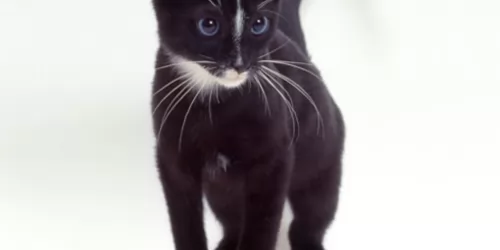 This is a fairly new cat breed that was discovered in New Mexico and its a rare cat. It was in 1984 that the cat was identified.
This is a fairly new cat breed that was discovered in New Mexico and its a rare cat. It was in 1984 that the cat was identified.
There was a feral colony of cats and one particular, a tortoise-shell female was selected to be mated with male cats of no particular description. Her kittens were born with deep-blue eyes, showing that the gene was dominant.
The unusual cat breed was named Ojos Azules which means ‘Blue Eyes’ in Spanish.
The Ojos Azules comes with both short and long hair. The cat was accepted for registration by TICA in 1991.
Only cats with the recognizable deep blue eye gene have been called Ojos Azules.
There was a time when it was discovered that cranial defects could be linked to the gene, and while breeding was temporarily suspended, it is back on track.
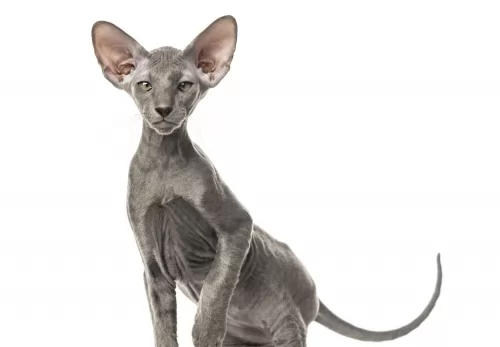 As a newer and rare cat breed, the Peterbald cat’s history is somewhat limited.
As a newer and rare cat breed, the Peterbald cat’s history is somewhat limited.
The breed was first developed in 1994, when a Russian breeder named Olga S. Mironova crossed an Oriental Shorthair cat with a Don Sphynx cat. This cat was to be known as the Peterbald.
The Peterbald cat is recognized by the Cat Fanciers Association. It was also accepted by The International Cat Association in 1997.
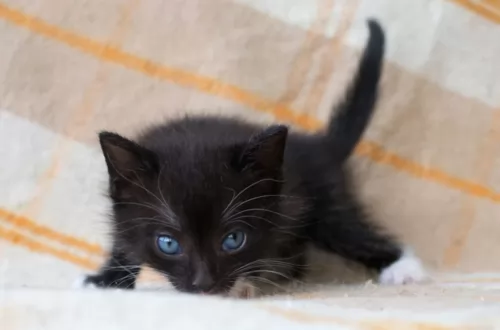 The beautiful Ojos Azules is a medium-sized cat and weighs in at between 3 and 5kg.
The beautiful Ojos Azules is a medium-sized cat and weighs in at between 3 and 5kg.
The cat’s most amazing round blue eyes are one of its most extraordinary features.
The gene in this cat isn’t linked to any particular fur color or pattern, so that means some of these cats will have a black coat but still have the blue eyes. The coat of the cat comes in many colors and is short and silky. Sometimes you’ll find some white markings on the paws and tail.
Not much is known of this cat breed because it is such a rare cat. Very few have owned this cat, but it seems as if, according to the people who have owned them, they are loving, friendly cats.
The small number that have been owned as domestic pets are said to have had balanced, loving temperaments, with the ability to show affection for their human owners.
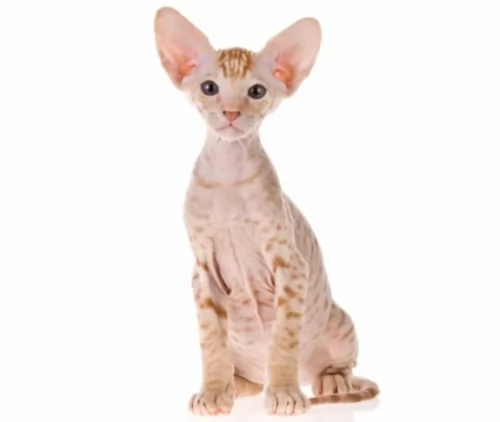 Looking a little bit futuristic, with a long, narrow head, almond-shaped eyes and large, pointed ears, the medium-sized, slimly built Peterbald cat can weigh between 3 and 6kg and is essentially a hairless cat.
Looking a little bit futuristic, with a long, narrow head, almond-shaped eyes and large, pointed ears, the medium-sized, slimly built Peterbald cat can weigh between 3 and 6kg and is essentially a hairless cat.
Although Peterbalds are considered a cat breed that are essentially hairless, not all of them are hairless as there are some that have a very short coat. There are some that are born with quite a bit of hair but they lose this.
In fact, their coat color as well as certain markings can be in various shades and patterns.
Peterbalds are easy-going, social cats with a sweet nature. They are affectionate towards their human companions and are quite vocal too, liking to talk to their owners. They are active and playful and enjoy playing with children and even other pets in the home.
In fact, they are adaptable cats and will slot into different home environments and lifestyles. The hairless variety is best as an indoor cat and this is why they suit living in apartments as well.
They are independent and intelligent, and people who have owned them say their pets often behave like a dog, wanting to be involved in their human's activities.
 The Ojos Azules cat, apart from its amazing eyes, is a regular cat that requires the same devotion from his human family that other cats enjoy.
The Ojos Azules cat, apart from its amazing eyes, is a regular cat that requires the same devotion from his human family that other cats enjoy.
Because this cat is so rare it is unlikely that you have one, but whatever furry feline friend you have, treat it with love and attention. The worst thing humans can do is to buy a pet, become bored with it, and then discard it.
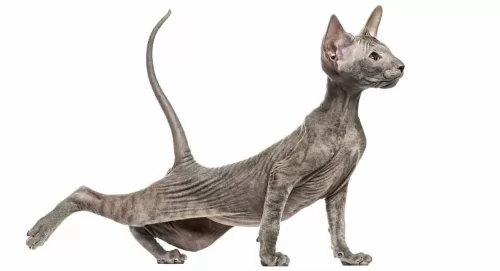 These Peterbalds are very intelligent cats and also very affectionate with their human owners. They are always up for a game and are playful and social.
These Peterbalds are very intelligent cats and also very affectionate with their human owners. They are always up for a game and are playful and social.
While they make excellent family pets and companions, one just has to take special precautions with the hairless variety and ensure that they don't become too hot or too cold.
They’re balanced in nature and adapt to the different human personalities in the household as long as its human owners are kind and respectful towards animals. With the right level of love, kindness and respect, they become ideal companions.
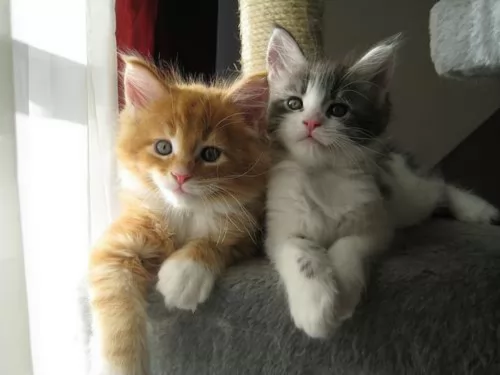 There don’t seem to be too many breed-specific health conditions associated with the Ojos Azules.
There don’t seem to be too many breed-specific health conditions associated with the Ojos Azules.
Having your cat spayed or neutered is beneficial to the cat long-term. Not only that, but it prevents unwanted pregnancies. Thousands of unwanted cats land up in animal shelters or are euthanized every year.
When you bring a new Ojos Azules kitten into the home, you will need to ensure the kitten is vaccinated, but also ensure he is tested for- and free of parasites.
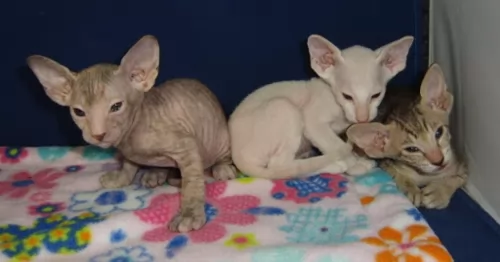 One of the more obvious things to watch out for with this particular cat is his hairlessness. This means he is more susceptible to the cold as well as to the heat. If he is outdoors, you have to be careful with his skin as it could get burned. Rough play with children could also cause scratching of the sensitive skin.
One of the more obvious things to watch out for with this particular cat is his hairlessness. This means he is more susceptible to the cold as well as to the heat. If he is outdoors, you have to be careful with his skin as it could get burned. Rough play with children could also cause scratching of the sensitive skin.
This particular cat is a fairly new breed and so there are few genetically inherited problems to be careful of.
Their large ears might prove to be a problem, and you will need to check the interiors and see that they remain clean. Also, trim his claws. If you fear that you could hurt your cat while attempting to groom him, rather take him along to professional, reputable pet groomers or have your vet do these grooming processes for you.
Whenever your Peterbald is sick you will need to get him to the vet. As it is, as a kitten, he will need to be taken to the vet to have his regular vaccines to protect him from some of the deadly cat diseases there are.
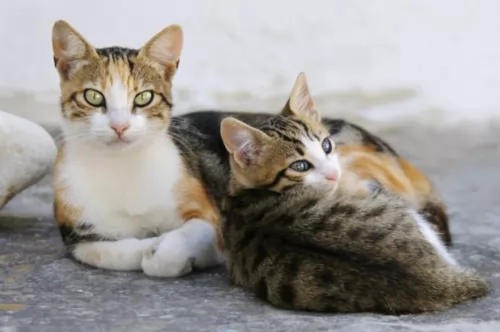 There are no particular requirements when caring for the Ojos Azules. Like other cat breeds, this cat also needs to be loved and well looked after.
There are no particular requirements when caring for the Ojos Azules. Like other cat breeds, this cat also needs to be loved and well looked after.
Contrary to what many people think, a cat isn’t a non-maintenance creature that can look after itself. There are many cat breeds that crave the companionship of their human owners and they need to be looked after carefully.
Ensure the best quality cat foods there are. There are many commercial cat foods and you want the high-quality ones with meat listed as the top ingredient.
A cat is a carnivore and meat is imperative for your cat to be healthy. If you feed your cat one of the commercially manufactured cat foods there are, you’ll find the food comes as dry, semi-moist, and canned.
The food you choose will come down to you and your cat’s preferences. If in any kind of doubt, speak to your local vet for recommendations. Remember, that an old cat, a pregnant cat or an ill cat will require a certain type of food.
You’ll need to coax your cat to use a litter box. The litter box should be in a quiet place where he can do his business in peace. Make sure you have the tools to scoop out your cat’s feces every single day. Cats like a clean litter box.
Provide the cat with a scratching post. If you have a cat as a pet, you must know it will scratch. You can’t change your cat’s behavior but you can do something about it to deter your cat scratching your furniture. You can buy him a scratching post so that he can scratch the way all cats do.
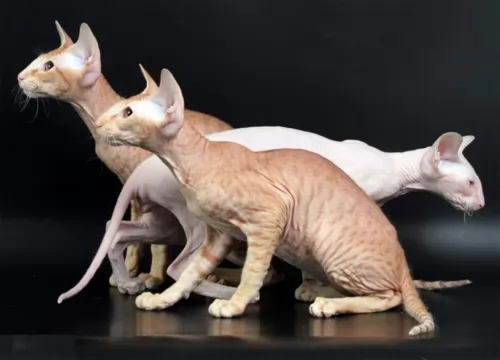 The Peterbald cat with its little or no hair is considered to be a low-maintenance cat. Their owners don’t have to worry about excessive shedding. Bathing these cats is important so that oils don't build up and cause skin irritation.
The Peterbald cat with its little or no hair is considered to be a low-maintenance cat. Their owners don’t have to worry about excessive shedding. Bathing these cats is important so that oils don't build up and cause skin irritation.
These cats are also best as indoor cats, but then again, some gentle sunshine on the skin will do him the world of good, and he loves the feel of the warm sun.
There are some Peterbald cat owners who gently bath their cats, sometimes once a week to get rid of the oil on the skin. If it isn’t possible to bath your cat, check out at your local vet as you do get special wipes for these cats that are effective in removing dirt and oil.
Also, speak to your vet about skincare and the possibility of moisturizing creams specially made for these cats and which are gentle and non-toxic.
This is a slim, athletic cat, and like all other cats, you have to be careful about weight issues. Any amount of weight with this cat can bring on a host of health issues such as extra pressure on the joints, not to mention other weight-related diseases such as diabetes and heart disease.